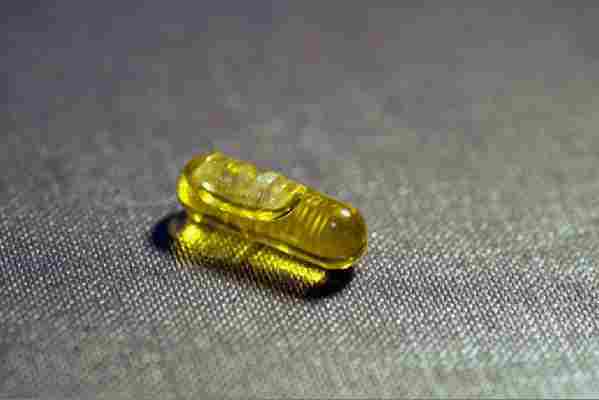Surprising Side Effects Of Fish Oil Supplements
Benefits and Side Effects of Fish Oil
The benefits of fish oil are many. If your mother was anything like mine, every time fish was for dinner, you heard her say:

“Eat it up, you’ll be brainy!”
Fish oil has been known to help brain function, but what are other fish oil benefits?
Well, you may be surprised at the number of benefits of fish oil. Fish oil has a great impact on our body as almost every aspect of our health is related to fatty acids. Omega-3 fatty acids are essential for our bodies and it seems most of us are not consuming enough.
Here is a guide to some of the possible benefits for you taking this popular omega-3 supplement.
*As with any medication, you should consult your doctor before starting a supplement regimen to see if it is right for you and to check for side effects or possible interactions.
Benefits of Fish Oil
Containing the omega-3 fatty acids DHA and EPA, fish oils have been scientifically studied for their potential to benefit the body in many ways. Here’s a roundup of what science says are the benefits of fish oil.
Cardiovascular Health
According to the American Heart Association, cardiovascular disease affects over 93 million adults – to put that into perspective, that is one in three of the population. They recommend omega-3 fatty acid supplements high in triglycerides, such as fish oil, for sufferers of coronary artery disease. 1 2
Fish oil studies have proven to lower triglycerides, a type of fat (lipid) in your blood that is attributed to a higher risk of heart disease. 3
Fish oil studies have also noted other cardiovascular benefits of omega-3 in fish oils – in particular, survival rates for those who had suffered heart attacks. A study of individuals who had previously suffered a heart attack supplemented for six months with a high dosage of omega-3 fish oil. The outcome showed a significant improvement in the overall functioning of the heart. 4
Arthritis
According to the Arthritis organization, arthritic conditions eafect over 50 million Americans. Arthritic diets are recommended to have high omega-3 fatty acids, especially for the inflammatory forms of arthritis. 5 6
Studies with participants who suffered with rheumatoid arthritis showed omega-3s supplements had a significant reduction on joint pain. Another trial used fish oil to reduce arthritic pain using 1200 mg per day of omega-3 fatty acids; fish oil was shown to be a safer alternative than NSAIDs. 7
Alzheimer’s Disease
The link between a diet with fish oils and the potential benefits of helping those suffering with Alzheimer’s disease has been researched for many years. Fish oils contain the essential fatty acids vital for brain function. It has been found this helps slow cognitive decline. 8
Multiple research studies and trials have shown that increasing your intake of omega-3 fatty acids from fish oil, and specifically DHA, can protect against unhealthy brain aging – one of the causes of dementia. 9
One single study over six months looked at the use of fish oil supplements for helping brain atrophy in older adults. Findings concluded that fish oil was also effective at decreasing cognitive decline in participants. 10
Skin Health
The eicosapentaenoic acid (EPA) found in fish oils greatly benefits skin health. Research has shown that fish oils help with sunburnt skin particularly the inflammation caused by ultraviolet (UV) damage to the skin’s surface. 11
Fish oil supplements have shown to improve acne severity, study findings noted better results with individuals who suffered moderate to severe acne. 12
Eye Disorders
The use of omega-3 oils and dry eye disease has had a lot of scientific research as dry eye disease is indicated as a possible inflammatory cause. 13
Dry eye disease can lead to visual loss and is a very uncomfortable condition. A clinical trial recently used omega-3 fish oil supplements over a twelve week period and results showed a significant improvement in tear osmolarity. 14
Type II Diabetes
Diabetes is a big health issue in modern life. In America, 1 out of 3 adults have a predisposition to diabetes. Without weight loss and moderate physical activity, 15-30% of people with prediabetes, will develop type 2 diabetes within five years. 15
Studies into the impact of omega-3 fish oils in a diet to manage diabetes has shown that DHA and EPA might have positive effects with early intervention on glucose control and lipid levels. 16
Other studies are still preliminary but show potential for fish oil omega-3 to be used in the prevention and treatment of diabetic complications.17
Attention Deficit Hyperactivity Disorder (ADHD)
Those who suffer with ADHD were shown to have lower concentration of omega-3 polyunsaturated fatty acids in their blood. Omega-3 fatty acids are essential and needed by the body for proper brain function and development.
One study of children with ADHD did show a significant specific improvement in behavior and academic performance. Another study showed it was specifically docosahexaenoic acid (DHA) that had the positive improvements. 18 19
Both these trials are early studies and more evidence is needed to claim that specifically fish oil omega-3 fatty acids are beneficial to those suffering ADHD.
Cancer
Diets rich in omega-3 fatty acids have shown to be beneficial in preventative and curative effects for many forms of cancer, including colon, prostate, and breast. 20
The outcome of a study looking at fish oil supplements for breast cancer concluded:
“Supplementation of newly diagnosed breast cancer patients with EPA and DHA led to a significant change in the composition of plasma fatty acids, maintained the level of CD4+ T cells and serum levels of hsCRP, suggestive of a beneficial effect on the immune system and less active inflammatory response.” 21
Premenstrual Syndrome (Dysmenorrhea)
Painful menstrual cycles are very common in America according to the ACOG. 22 A recent study concluded that taking a fish oil supplement to help with the intensity of pain and other symptoms of dysmenorrhea meant a reduced amount of pain relief medication was taken.
This showed that the omega-3 fatty acids in fish oil had a positive effect and should be added to diet to help lessen the symptoms of pain associated with premenstrual syndrome.23
Side Effects of Fish Oil
Taking up to three grams of omega 3 fatty acids a day from fish oil is generally regarded as safe, according to the U.S. Food and Drug Administration. Fish oil supplements have few side effects; most noted are bad breath, indigestion, belching (fish burps), loose stools, and nausea. 24
To aid nutritional absorption and decrease undesired side effects, fish oil supplements are best taken with food. As with all fatty acid supplements, they should not be taken prior to exercise. 25
If you have a known allergy to fish or shellfish, it’s advisable to speak to your doctor before taking fish oil or to avoid fish oil supplements completely.
Fish oils have known interactions with prescribed medications if you are taking any of the following medicines consult your doctor first. 26
Blood thinning medications (anticoagulant/antiplatelet drugs) such as warfarin.
Blood pressure medications (Antihypertensive drugs).
Birth control pills (Contraceptive drugs).
Individuals with type 2 diabetes may find it hard to control fasting blood sugar levels while taking fish oil supplements. You should take fish oil supplements under your doctor’s supervision.
Some concerns over environmental pollutants, such as mercury, contaminating fish oil products is discussed above. This is a minor concern with third party product testing and purchasing a reputable quality brand. There are probably more pollutants in whole fish than fish oil supplements.
Final Conclusion
Fish oil supplements are often taken as preventative – not as a treatment. Omega-3 essential fatty acids are vital to the body for optimal health, and supplementation is very effective.
Omega-3 deficiency can lead to serious health complications and fish oils are a safe way of getting a quality omega-3s in your diet.
Source
This is our guide to fish oil. Check out our other installments:
Everything You Need To Know About Fish Oil
Best Fish Oil (Which Should You Take?)
Fish Oil Vs Krill Oil – What’s The Difference?
Download Your FREE Paleo Starter Kit Today! 3-Day Paleo Diet Meal Plan
Comprehensive Paleo Diet Shopping List
5 of Our Favorite Paleo Diet Recipes Check your email to download the free resources.
14 Little-Known Side Effects Of Fish Oil Supplements
Fish oil supplements have one of the best reputations in the dietary and nutrition world. It’s full of omega 3-fats which are considered essential for brain development and is often prescribed as an effective way to reduce triglyceride levels, along with a healthy diet. However, is it really as good as it’s chalked up to be? Here are some little-known side effects of fish oil.

Mild Side Effects Of Fish Oil
1. Mild Skin Rash
Advertisements
Some people experience skin rashes when they start supplements of fish oil. If you do see a rash forming when taking fish oil, alert your doctor, because it may be part of an allergic reaction.
2. Back Pain
Advertisements
Doctors still aren’t quite sure why this happens but if you do experience back pain after starting the supplements, notify your doctor. It may be a sign of some underlying health condition that needs to be treated.
3. Unpleasant Taste
Advertisements
People often complain of a fishy aftertaste when on these supplements which is extremely common. However, if a bottle of supplements smells particularly strong when you open it, it’s possible that the capsules may have gone rancid. Make sure to store them properly and throw them out when they cross their expiration date.
4. Upset Stomach
Advertisements
One may experience nausea, vomiting, and diarrhea while on these supplements. Usually, these can be remedied by taking the capsules with a meal. It’s worth noting that you may experience vomiting and diarrhea if the capsules have gone rancid, so check the expiration date on your bottle.
5. Frequent Belching
Advertisements
One may feel more bloated and gassy than usual while on these supplements. Researchers aren’t sure why but it’s worth mentioning this to your doctor as well.
6. Flu Symptoms
Advertisements
Some people experience fevers, chills, colds, and sore throats while on this supplement. This is probably because your body is finding it difficult to tolerate the oil or you may have consumed a contaminated capsule.
Moderate To Serious Side Effects Of Fish Oil
1. Chest Pain And Uneven Heartbeat
Advertisements
In some people, fish oil supplements cause irregular heartbeats and chest pain. An irregular heartbeat can be extremely dangerous and lead to heart failure. If you experience chest pain after taking fish oil supplements, make sure to see your doctor as soon as possible.
2. Allergic Reaction
People who are allergic to seafood and/or shellfish may want to stay away from fish oil capsules as they might trigger a reaction, which may include hives, difficulty breathing, or swelling of the face, lips, tongue, or throat. Check the ingredients as well to make sure there are no other components that you may be allergic to.
3. Increases Risk Of Bleeding Disorders
Bleeding disorders are conditions where the blood does not clot or ‘coagulate’ naturally. This may be an inherent condition or can be caused by certain medications which thin out the blood. Fish oil supplements are seen to increase this risk of bleeding without coagulation. This may also cause people to bruise more easily. People with bleeding disorders and those who take blood-thinning medication should talk to their physician before starting the supplement.
4. Insomnia And Anxiety
While these are extremely rare, some people do experience an increase in symptoms of insomnia, anxiety, and overall agitation. These symptoms normally stop when the course of fish oil supplements is halted.
Possible Long-Term Side Effects Of Fish Oil
1. Increases Oxidative Damage
Omega 3s are extremely vulnerable to oxidative damage. This means that they can spread this same effect to the rest of the body, increasing inflammation and therefore, the likelihood of developing chronic illnesses. Several studies have shown that consumption of fish oil supplements increases levels of oxidative stress and inflammation within just a short period of time.
2. Increases LDL Levels And Insulin Resistance
Fish oil seems to cause an increase in the levels of LDL or ‘bad cholesterol’ in people with metabolic syndrome. People with metabolic syndrome are those who suffer from a number of conditions such as increased blood pressure, excess abdominal fat, increased blood sugar and cholesterol levels. They also showed increased insulin resistance as well. Some studies show that in people with high cholesterol, fish oil actually adversely affects the ratio of LDL to HDL and in some cases the triglyceride decrease is insignificant.
3. Increases Risk Of Prostate Cancer
Some studies show that omega-3 fatty acids protect from prostate cancer, while other studies show the contrary. Researchers found that men with higher saturations of omega 3s in their blood were more likely to develop high-grade prostate cancer.
4. Reduces Immunity
In small amounts, omega 3 is an anti-inflammatory compound which prevents disease and deterioration. Some researchers have observed that high levels of omega 3 have an adverse effect on the immune system. It may lead to an abnormal immune response when fighting a bacterial or viral infection. This may make one more susceptible to sickness.
Do You Really Need Them?
Fish oil supplements are often cited as one of the best ways to maintain and improve heart health but studies show that it does not really have a major effect in individuals who actually have risk factors associated with heart disease. Many speculate that the benefits of fish oil supplements were over-exaggerated in earl studies.
If your doctor has prescribed for you to take these supplements to reduce your triglyceride levels, by all means, continue taking them at the recommended dose, but the major danger with these supplements is getting an overdose of omega-3 when you may not really need it. Nowadays, foods like eggs, milk, and other dairy products are often fortified with omega-3. If you take supplements along with these foods, you’re getting an overdose of omega-3 without even realizing it.
Where To Get Your Omega 3
If you’re still considering taking the supplements, first try getting your omega-3 from foods in which they naturally occur. The American Heart Health Association recommends two servings of fish a week as part of a healthy diet, to maintain heart health. Salmon, mackerel, and light tuna are great options. If you’re not a fan of fish, try flax seed, flax seed oil, chia seeds, walnuts, pumpkin seeds, soy, and canola oil. These foods also contain other essential vitamins and minerals which support absorption and general functioning. This is much better nutritional value than the capsules One or two servings of these foods a day should cover your nutritional need.
Surprising Side Effects Of Fish Oil Supplements
Surprising Side Effects Of Fish Oil Supplements

Hearing the word "oil" associated with "fish" may conjure up dreams of your favorite fish and chips, but the fish oil in this case is the healthy kind.
Fish oil supplements contain Omega-3 fatty acids, which are vital for our bodies. Omega-3 fatty acids help to manufacture hormones that regulate genetic and blood-related functions that may reduce the chance for heart attacks (via Harvard Health Publishing). Despite the importance of Omega-3 fatty acids, our bodies do not produce them organically, and so we get them from certain foods. This is why you may have heard people recommend salmon or sea bass.
While fish oil supplements help to bolster the production of Omega-3 fatty acids, they do have some side effects that you should be aware of before you consider adding them to your diet.
For one, some research has shown that fish oil supplements could cause bleeding (via the Journal of Trauma Nursing). So, if you have surgery coming up, you may want to hold off on taking fish oil supplements to avoid this possible side effect.

